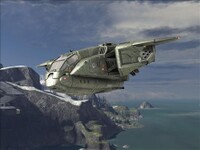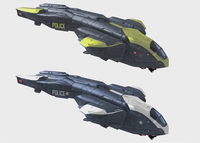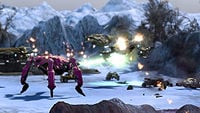D77-TC Pelican
From Halopedia, the Halo wiki
The Dropship 77-Troop Carrier (abbreviated D77-TC), more commonly known as the Pelican, is an extremely versatile craft used by the United Nations Space Command, mainly for the pickup and transportation of personnel, vehicles and equipment, although it can also be used as a powerful support gunship.
Background
The D77-TC Pelican is mainly responsible for the rapid infiltration and extraction of troops. They also deliver vehicles and equipment to the battlefield, when required. The D77-TC has been in service for over fifty years, and is the primary tactical support aircraft of the UNSC. The Pelican serves a multi-role purpose, it is fully capable of atmospheric flight and can land almost anywhere without difficulty, the Pelican is also capable of limited spaceflight, which the UNSC uses as a primary way of delivering troops to the surface from orbit. Standard armament consists of one Class III externally powered projectile weapon at the fore of the vehicle, and one Class I gas-operated projectile weapon mounted at the rear, in the extended crew area. More heavily armed variants exist, with multiple and more powerful weaponry. [1].
Payload Capacity
The Pelican is capable of carrying passengers and cargo using a combination of internal and external methods. Specifically, the main compartment of the Pelican sometimes called the "Blood Tray"[2], has seats for ten people, with additional space for five standing. Other variants have displayed the ability to hold considerably more: The SPARTAN-II's were assigned a specialized Pelican, able to hold the entire team of twenty five as well as fitting cutting gear to board a Covenant warship, while the UNSC ODST forces on Installation 04 could fit fifteen Marines into each dropship. Three Pelicans used for the SPARTAN-III Program carried 300 children.
The large aft overhang gives an attachment point for additional, cargo and ordnance. Possible payloads include a troop deployment pod, a Scorpion tank, a Warthog, or eight Resupply Canister Type-B Capsules. The maximum payload of a Pelican is seventy tons.
Armament
Standard armament consists of a chin-mounted 40mm rotary-cannon which was common prior to 2525, but was later superseded by a 70mm weapon. These chain-guns are usually controlled by the pilot's helmet so that it would aim in the direction of the pilots view, similar to the modern TADS/PNVS found on Apache Gunships or the HUD system in a SPARTAN's armor. Some dropships boasted twin chain guns firing depleted uranium slugs.[3].
Missile pods, each holding eight ANVIL-II ASMs, can be mounted under each wing to engage more maneuverable or better protected targets. Fire control is typically delegated to the copilot, who was assisted by helmet-mounted display. A M247 GPMG, or a 25mm grenade launcher can also be mounted facing out of the rear cargo hatch and the latter two can be folded flat against the roof of the internal bay when not in use by the crew chief or passenger.
Propulsion
The main engines are mounted in pairs in four nacelles, one on each wing and two at the rear. The nacelles can articulate independently, thus altering (i.e, Vectoring) the direction of thrust and improving the dropship's low altitude maneuverability. Six ventral thrusters, two on each wing nacelle and one on each aft nacelle, allow the Pelican to land and take off vertically. These engines are capable of both space and atmospheric operation. The D77, although fully capable of orbital insertion, is too small to be equipped with a Shaw-Fujikawa Translight Engine, and thus is incapable of slipspace travel.
The wings mounted on a Pelican seem extremely small, too small to support the weight of dropship and payload alone. It is speculated that it incorporates at least some lifting body principles, its own hull providing most of the lift necessary.
Variants
D77H-TCI
- Main article: D77H-TCI Pelican Dropship
Halo 3 introduces the new variant of the Pelican, the D77H-TCI Pelican (The "H" stands for "Heavy", the "I" probably stands for "Infantry"). Externally, it appears nearly identical to the Pelicans used in Halo: Combat Evolved and Halo 2, except for being more angular. Internally, though, the craft has been renovated and it can store equipment in overhead netting. It also mounts an AIE-486H Heavy Machine Gun at the opening of the troop-bay for suppression fire during insertion/extraction missions. The cockpit has been altered, and instead of the side-by-side positioning of the pilot and copilot, the pilot now sits at the fore of the dropship, with the co-pilot behind him/her, and at a higher position, in tandem.
Law Enforcement
Halo 3: ODST introduces a civilian-variant of the Pelican, operated by the New Mombasa Police Department and differentiated from its military counterpart by a black and white color scheme, "POLICE" replacing the traditional "MARINES" on the external hull, and a noted lack of armament. Under the craft's chin, where a machine gun turret or autocannon would normally be installed, are various interchangeable sensors used by the police for aerial surveillance and crowd control.
Identified Pelicans
Pelicans receive serial numbers to be identified by during radio transmissions, particularly in combat situations. Each serial number consists of a letter from the Phonetic Alphabet followed by a number. Though a few Pelicans have this number inscribed on their cargo bays, most have no distinguishing mark on their exteriors. It is unclear how the numbers are chosen, but with their spread across the alphabet and numerals, it can be inferred that a very large number of Pelicans are in service, perhaps as many as 26,000.
| |||||||||||||||||
Trivia
- Pelicans in Halo Wars show a Legendary symbol under the cockpit with "Death To Covenant" written under it.
- All Pelican dropships in Halo: Combat Evolved bear either the numbers E419 (Echo 419) or V933 (Victor 933). The Pelican in "The Silent Cartographer" is incorrectly labeled as V933. All others are labeled E419. It is likely that because of the extreme time constants of the development cycle of Halo: CE Bungie was unable to properly label each pelican correctly.
- Pelicans in Halo: Combat Evolved and Halo 2 are never seen carrying more than six Marine troops at a time, despite being capable of carrying up to fifteen. However, it is likely that this is merely because UNSC troops usually work in small teams during engagements, comprising of five to six men, known as Fire Teams. Another likely reason is that the Master Chief, in full armor, weighs in at about 1,000 lbs, making him weigh approximately as much as five fully armed marines. So six Marines, plus the mass of five means the Pelican is towing the average of eleven, as Halo: The Flood stated, fifteen is more than pushing the limit as it is, which makes very little sense as the Pelican is capable of carrying a 65 ton tank, so the most likely reason would be gameplay balance; if the Fire Teams were replaced with squads consisting of fifteen Marines then the game would become too easy.
- Although in Halo 2, the Pelican carries two missile pods, each loaded with eight ANVIL-II Air-to-Surface Missiles, the only time the dropships ever use them in combat is during the end of the level "Metropolis", when some launch them against a Scarab, and at the beginning of "Delta Halo", when Johnson's Pelican launches some if there are any Covenant left when the Pelicans come in. It is also used in "Quarantine Zone", after you first encounter a Scorpion. When you move to the next section, a Pelican (unknown if human or Flood-controlled) will fire missiles as it passes by at either you or the Sentinels. Its 70mm chain gun, on the other hand, is used twice during "Outskirts", both times against Jackals. Also, in the level "Delta Halo", when the Pelican drops off a Scorpion, if there are any Covenant troops left alive, the Pelican will attack them with its chain gun. On occasion the Pelican also attacks the Banshees when they are on approach to the player's position. The gun is also used during the beach assault on Alpha Halo, on the Halo: CE level, "The Silent Cartographer". The gun is fired into a group of Grunts, and will inflict varied damage, depending on the difficulty.
- The UD4L Cheyenne dropship from the movie Aliens served as conceptual inspiration of the Pelican for Halo.
- In Halo: Combat Evolved on the level "343 Guilty Spark", you can stay on the Pelican by throwing a grenade before it takes off again. You will not die but the Pelican will crash on the top of the map on the hills where you can find the unarmed Marine.
- The Pelican's troop bay has been stated by Bungie employee Robert McLees as large enough to fit a modern M1A1 Abrams main battle tank.
- The Pelican in Halo: Combat Evolved has a darker cockpit that the one in Halo 2 and the D77H-TCI in Halo 3, both of the Pelicans that appear have a more transparent cockpit.[4]
Gallery
- PelicanII-Sil.gif
D77-TC schematics
- 1215452971 Pelican.jpeg
A Pelican in Halo: Combat Evolved.
- 1217908331 Marines.jpg
A group of Marines in a Pelican.
- 1225327600 Destroyed pelican.jpg
A crashed Pelican in flames.
- PelicanOnHarvest.JPG
Three Pelicans in the Halo Wars CGI trailer.
- Phantom and Pelican.png
A Pelican in a woodland camouflage scheme.
A squadron of Hornets and Sparrowhawks attempt to protect a number of Pelican dropships from a Scarab in Halo Wars.
- Pelican04.jpg
The Pelican as it appears in Halo 2.
Sources
- ^ halo3.com
- ^ Halo: Ghosts of Onyx, page 203
- ^ Halo: Ghosts of Onyx, page 40
- ^ The Art of Halo 3, page 38.


